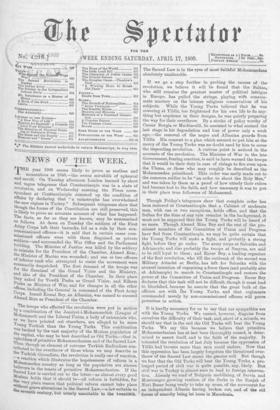If we go a step further in probing the causes
of the revolution, we believe it will be found that the Sultan, who still remains the greatest master of political intrigue in Europe, has pulled the strings, playing with consum- mate mastery on the intense religious conservatism of his subjects. While the Young Turks believed that he was cowering at Yildiz, too frightened for his own life to do any- thing but acquiesce in their designs, he was quietly preparing the way for their overthrow. By a stroke of policy worthy of Caesar Borgia or Machiavelli, he assented to what seemed the
620 last stage in his degradation and loss of power only a week ago,—the removal of the negro and Albanian guards from Yildiz. His consent to a plan which seemed to put him at the mercy of the Young Turks was no doubt used by him to cover the impending revolution. A curious point is noticed in the accounts of the revolution. The Minister of War in the late Government, fearing reaction, is said to have warned the troops that it would be their duty in case of risings to fire even upon the Ulema, or those who may roughly be described as the Mohammedan priesthood. This order was easily made out to the common soldier to be "an order to shoot the Holy Men," and was taken by them as a proof of how utterly their rulers had become lost to the faith, and how necessary it was to put in their place true followers of Mohammed.






































